SCXML-tutorial
| Contents | Overview | Examples | Editor | Forum |
|---|
<invoke>
The element is used to create an instance of an external service (for example: nested state machine)
Simple Example
Suppose you have multiple blocks with the same state machine logic
1. Unoptimized statechart without <invoke>
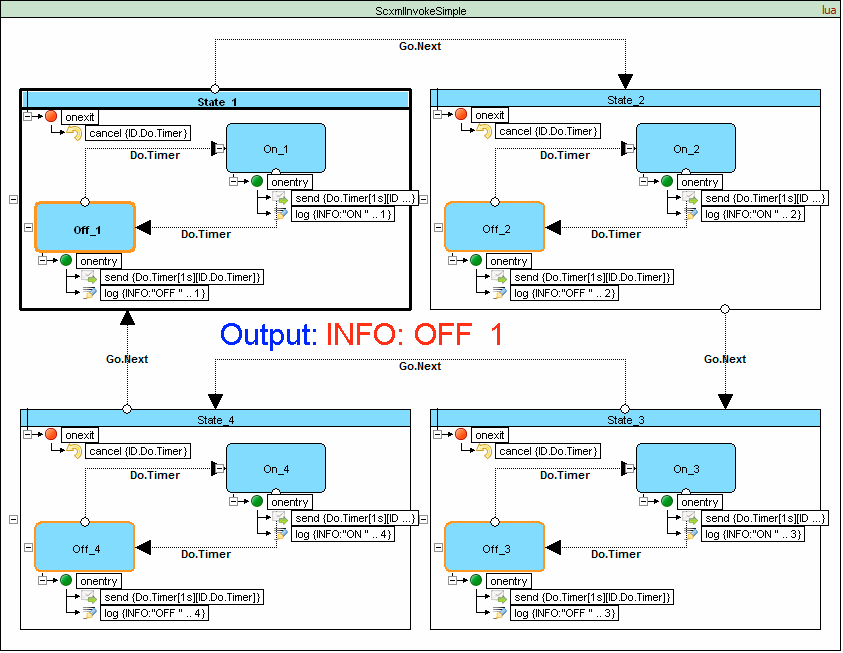
Source code
<scxml datamodel="lua" name="ScxmlInvokeSimple" version="1.0" xmlns="http://www.w3.org/2005/07/scxml">
<state id="State_1" initial="Off_1">
<onexit>
<cancel sendid="ID.Do.Timer"/>
</onexit>
<transition event="Go.Next" target="State_2"/>
<state id="Off_1">
<onentry>
<send delay="1s" event="Do.Timer" id="ID.Do.Timer"/>
<log expr="'OFF ' .. 1" label="INFO"/>
</onentry>
<transition event="Do.Timer" target="On_1"/>
</state>
<state id="On_1">
<onentry>
<send delay="1s" event="Do.Timer" id="ID.Do.Timer"/>
<log expr="'ON ' .. 1" label="INFO"/>
</onentry>
<transition event="Do.Timer" target="Off_1"/>
</state>
</state>
<state id="State_2" initial="Off_2">
<onexit>
<cancel sendid="ID.Do.Timer"/>
</onexit>
<transition event="Go.Next" target="State_3"/>
<state id="Off_2">
<onentry>
<send delay="1s" event="Do.Timer" id="ID.Do.Timer"/>
<log expr="'OFF ' .. 2" label="INFO"/>
</onentry>
<transition event="Do.Timer" target="On_2"/>
</state>
<state id="On_2">
<onentry>
<send delay="1s" event="Do.Timer" id="ID.Do.Timer"/>
<log expr="'ON ' .. 2" label="INFO"/>
</onentry>
<transition event="Do.Timer" target="Off_2"/>
</state>
</state>
<state id="State_3" initial="Off_3">
<onexit>
<cancel sendid="ID.Do.Timer"/>
</onexit>
<transition event="Go.Next" target="State_4"/>
<state id="Off_3">
<onentry>
<send delay="1s" event="Do.Timer" id="ID.Do.Timer"/>
<log expr="'OFF ' .. 3" label="INFO"/>
</onentry>
<transition event="Do.Timer" target="On_3"/>
</state>
<state id="On_3">
<onentry>
<send delay="1s" event="Do.Timer" id="ID.Do.Timer"/>
<log expr="'ON ' .. 3" label="INFO"/>
</onentry>
<transition event="Do.Timer" target="Off_3"/>
</state>
</state>
<state id="State_4" initial="Off_4">
<onexit>
<cancel sendid="ID.Do.Timer"/>
</onexit>
<transition event="Go.Next" target="State_1"/>
<state id="Off_4">
<onentry>
<send delay="1s" event="Do.Timer" id="ID.Do.Timer"/>
<log expr="'OFF ' .. 4" label="INFO"/>
</onentry>
<transition event="Do.Timer" target="On_4"/>
</state>
<state id="On_4">
<onentry>
<send delay="1s" event="Do.Timer" id="ID.Do.Timer"/>
<log expr="'ON ' .. 4" label="INFO"/>
</onentry>
<transition event="Do.Timer" target="Off_4"/>
</state>
</state>
</scxml>
You may put similar logic into external state machine, define params which should be passed from the main state machine. And then you may create multiple instances using <invoke> element. You just need to path individual parameters for each external state machine
2. Optimized statechart with <invoke>
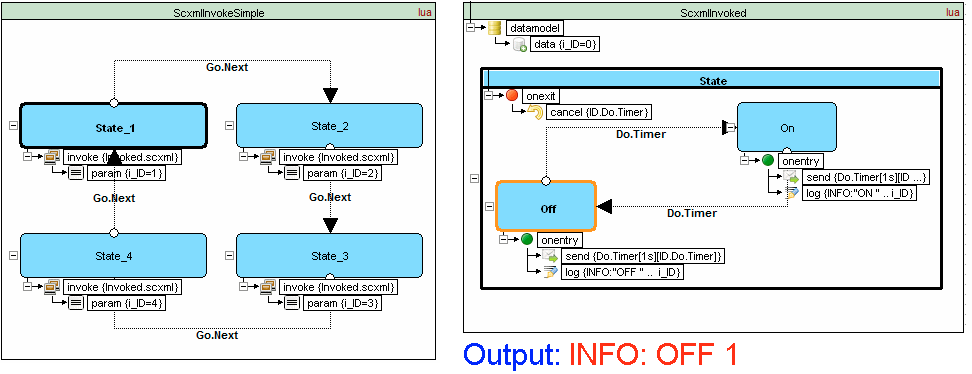
Source code - main.scxml
<scxml datamodel="lua" name="ScxmlInvokeSimple" version="1.0" xmlns="http://www.w3.org/2005/07/scxml">
<state id="State_1">
<invoke src="Invoked.scxml">
<param expr="1" name="i_ID"/>
</invoke>
<transition event="Go.Next" target="State_2"/>
</state>
<state id="State_2">
<invoke src="Invoked.scxml">
<param expr="2" name="i_ID"/>
</invoke>
<transition event="Go.Next" target="State_3"/>
</state>
<state id="State_3">
<invoke src="Invoked.scxml">
<param expr="3" name="i_ID"/>
</invoke>
<transition event="Go.Next" target="State_4"/>
</state>
<state id="State_4">
<invoke src="Invoked.scxml">
<param expr="4" name="i_ID"/>
</invoke>
<transition event="Go.Next" target="State_1"/>
</state>
</scxml>
Source code - invoked.scxml
<scxml datamodel="lua" name="ScxmlInvoked" version="1.0" xmlns="http://www.w3.org/2005/07/scxml">
<datamodel>
<data expr="0" id="i_ID"/>
</datamodel>
<state id="State" initial="Off">
<onexit>
<cancel sendid="ID.Do.Timer"/>
</onexit>
<state id="Off">
<onentry>
<send delay="1s" event="Do.Timer" id="ID.Do.Timer"/>
<log expr="'OFF ' .. i_ID" label="INFO"/>
</onentry>
<transition event="Do.Timer" target="On"/>
</state>
<state id="On">
<onentry>
<send delay="1s" event="Do.Timer" id="ID.Do.Timer"/>
<log expr="'ON ' .. i_ID" label="INFO"/>
</onentry>
<transition event="Do.Timer" target="Off"/>
</state>
</state>
</scxml>
Attribute Details
1. 'type'
A URI specifying the type of the external service. Valid values are http://www.w3.org/TR/scxml/ (Default), http://www.w3.org/TR/ccxml/, http://www.w3.org/TR/voicexml30/, http://www.w3.org/TR/voicexml21/ plus other platform-specific values. Must not occur with the 'typeexpr' attribute.
2. 'typeexpr'
Any value expression that evaluates to a URI that would be a valid value for 'type'. A dynamic alternative to 'type'. If this attribute is present, the SCXML Processor must evaluate it when the parent
3. 'src'
A URI to be passed to the external service. Must not occur with the 'srcexpr' attribute or the <content> element.
<state id="Parent">
<invoke src="Child.scxml" />
</state>
4. 'srcexpr'
Any expression evaluating to a valid URI. A dynamic alternative to 'src'. If this attribute is present, the SCXML Processor must evaluate it when the parent
<state id="Parent">
<invoke srcexpr="s_APP_PATH + 'Child.scxml'" />
</state>
5. 'id'
A string literal to be used as the identifier for this instance of <invoke>. Must not occur with the 'idlocation' attribute.
<state id="Parent">
<invoke id="ID_MODULE_CHILD" src="Child.scxml" autoforward="false" />
<onentry>
<!-- invoked session with id 'ID_MODULE_CHILD' will receive event 'Timeout' after 2 seconds -->
<send delay="2s" event="Timeout" target="#_ID_MODULE_CHILD"/>
</onentry>
</state>
6. 'idlocation'
Any valid data model expression evaluating to a data model location. See 5.9.2 Location Expressions for details. Must not occur with the 'id' attribute.
7. 'namelist'
A space-separated list of one or more data model locations to be passed as attribute/value pairs to the invoked service. (The name of the location is the attribute and the value stored at the location is the value.). Must not occur with the <param> element.
8. 'autoforward'
A boolean flag indicating whether to forward events to the invoked process. Default value is 'false'.
<state id="Parent">
<invoke src="Child1.scxml" autoforward="true" />
<invoke src="Child2.scxml" autoforward="true" />
<invoke src="Child3.scxml" autoforward="true" />
<onentry>
<!-- all invoked sessions with 'autoforward=true' will receive event 'Timeout' after 2 seconds -->
<send delay="2s" event="Timeout" />
</onentry>
</state>
NOTE: Autoforwared events may cause circlular event loops. To prevent this you need to disable autoforward and send events by submachine ID
In the example below parent and child machine will generate the same events and we need to convince that they do not affect each other
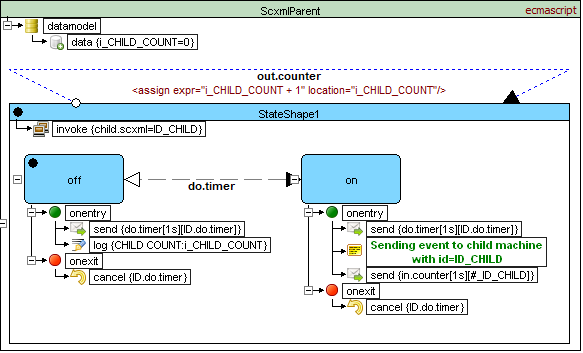
Source code - parent.scxml
<scxml datamodel="ecmascript" name="ScxmlParent" version="1.0" xmlns="http://www.w3.org/2005/07/scxml">
<datamodel>
<data expr="0" id="i_CHILD_COUNT"/>
</datamodel>
<state id="StateShape1">
<invoke id="ID_CHILD" src="child.scxml"/>
<transition event="out.counter">
<assign expr="i_CHILD_COUNT + 1" location="i_CHILD_COUNT"/>
</transition>
<state id="off">
<onentry>
<send delay="1s" event="do.timer" id="ID.do.timer"/>
<log expr="i_CHILD_COUNT" label="CHILD COUNT"/>
</onentry>
<onexit>
<cancel sendid="ID.do.timer"/>
</onexit>
<transition event="do.timer" target="on"/>
</state>
<state id="on">
<onentry>
<send delay="1s" event="do.timer" id="ID.do.timer"/>
<send delay="1s" event="in.counter" target="#_ID_CHILD"/>
</onentry>
<onexit>
<cancel sendid="ID.do.timer"/>
</onexit>
<transition event="do.timer" target="off"/>
</state>
</state>
</scxml>
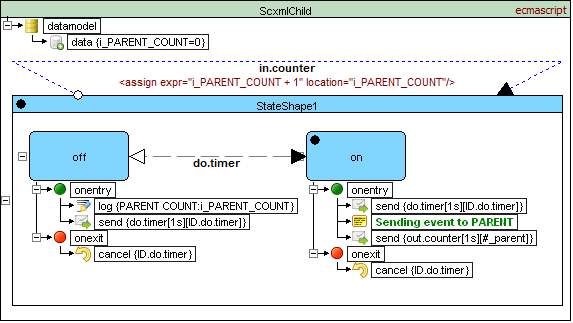
Source code - child.scxml
<scxml datamodel="ecmascript" name="ScxmlChild" version="1.0" xmlns="http://www.w3.org/2005/07/scxml">
<datamodel>
<data expr="0" id="i_PARENT_COUNT"/>
</datamodel>
<state id="StateShape1">
<transition event="in.counter">
<assign expr="i_PARENT_COUNT + 1" location="i_PARENT_COUNT"/>
</transition>
<state id="on">
<onentry>
<send delay="1s" event="do.timer" id="ID.do.timer"/>
<send delay="1s" event="out.counter" target="#_parent"/>
</onentry>
<onexit>
<cancel sendid="ID.do.timer"/>
</onexit>
<transition event="do.timer" target="off"/>
</state>
<state id="off">
<onentry>
<log expr="i_PARENT_COUNT" label="PARENT COUNT"/>
<send delay="1s" event="do.timer" id="ID.do.timer"/>
</onentry>
<onexit>
<cancel sendid="ID.do.timer"/>
</onexit>
<transition event="do.timer" target="on"/>
</state>
</state>
</scxml>
Output:
[Log] CHILD COUNT: 0
[Log] PARENT COUNT: 0
[Log] CHILD COUNT: 1
[Log] PARENT COUNT: 1
[Log] CHILD COUNT: 2
[Log] PARENT COUNT: 2
[Log] CHILD COUNT: 3
[Log] PARENT COUNT: 3
...
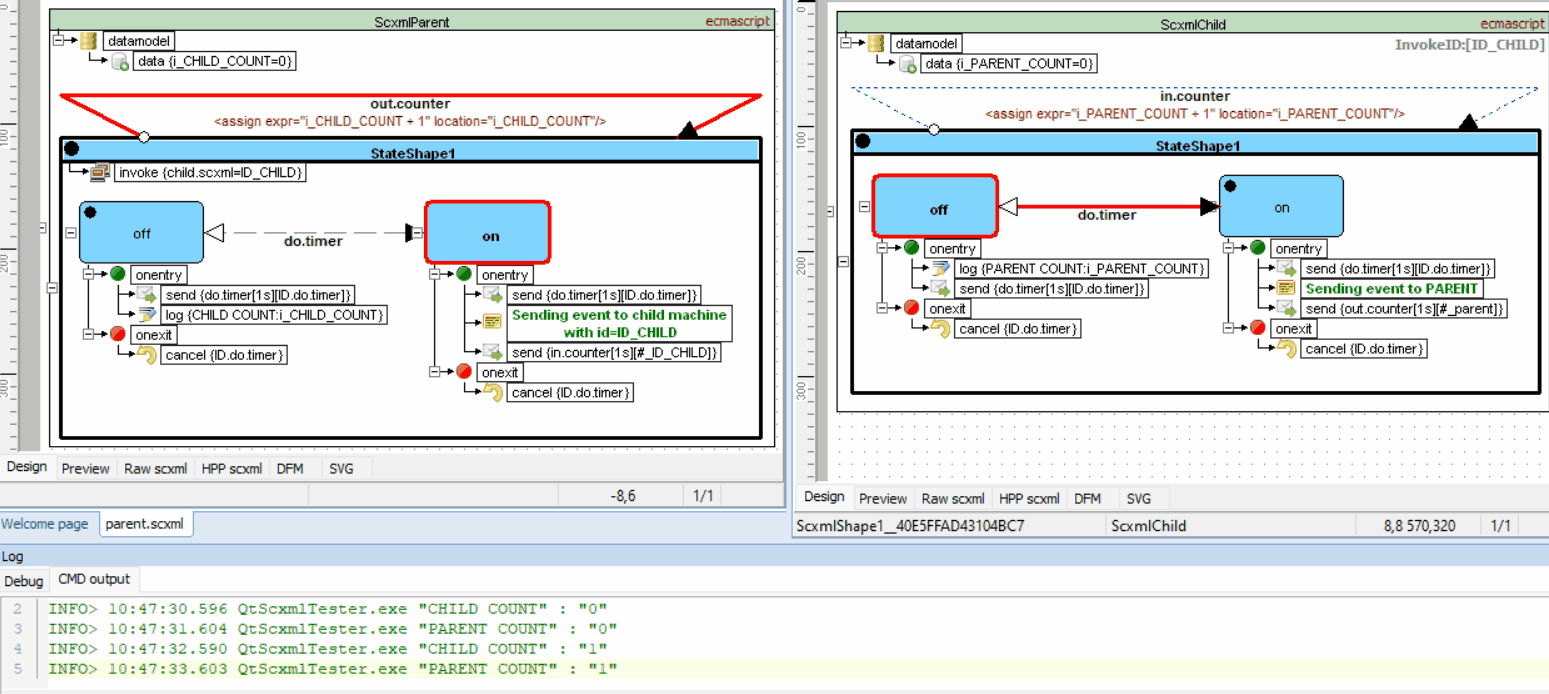
Dining Philosophers Problem example
The example shows how to communicate between multiple invoked submachines
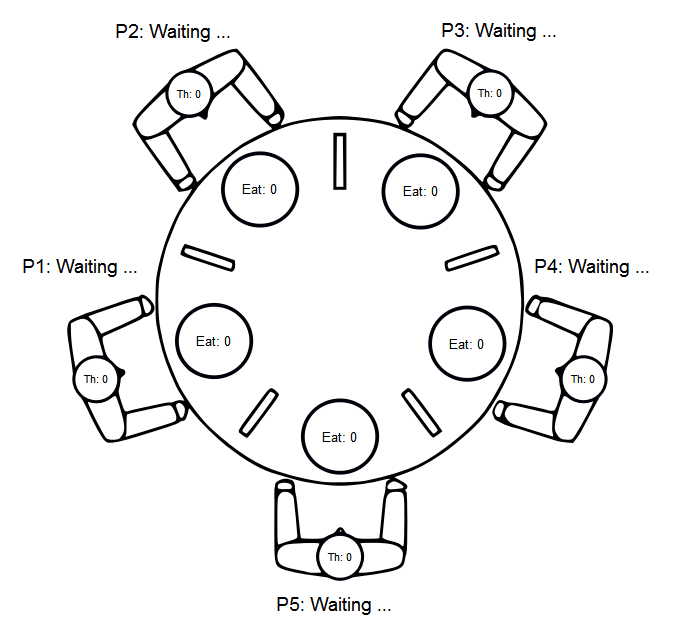
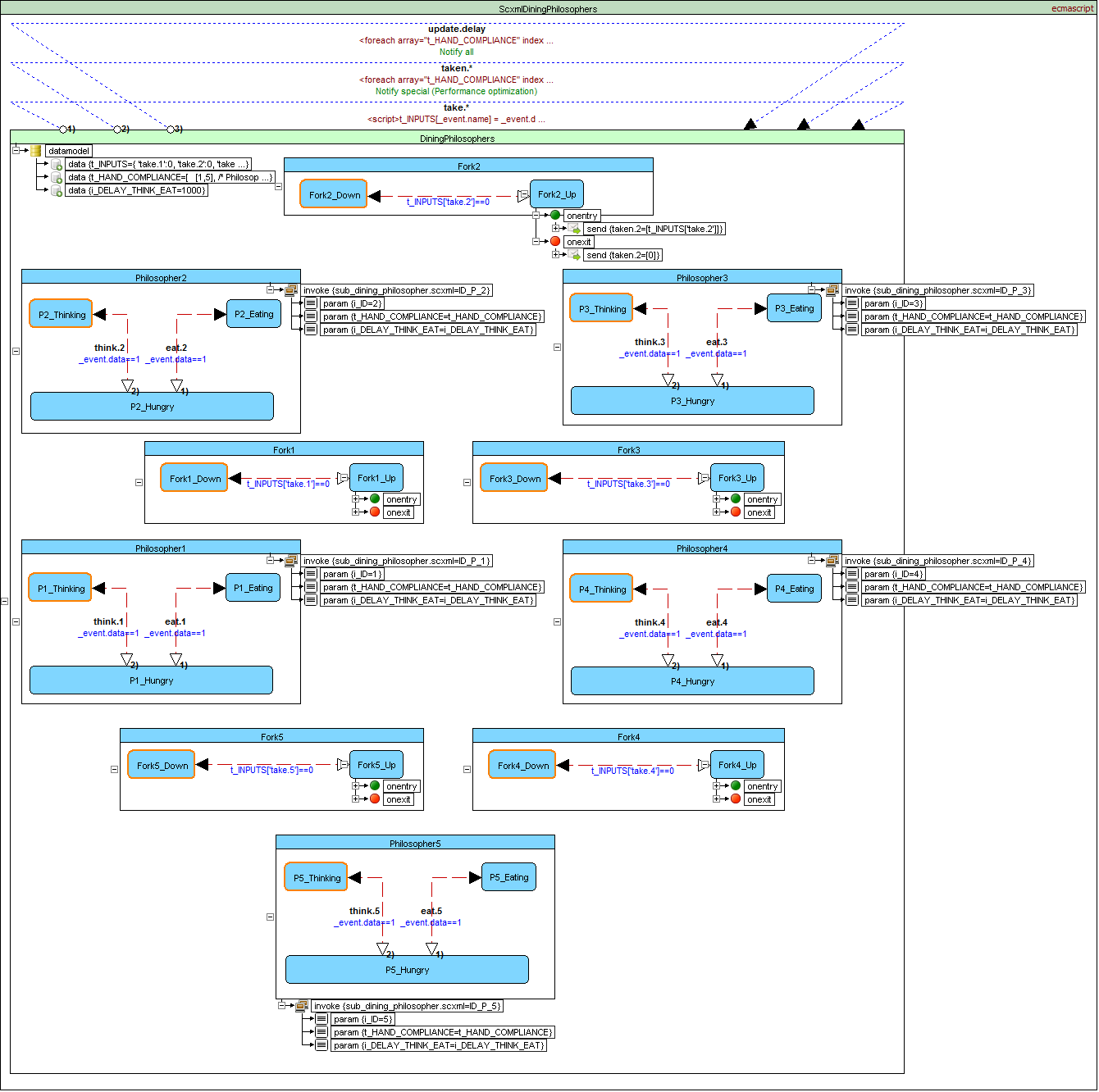
Source code - main.scxml
<scxml datamodel="ecmascript" name="ScxmlDiningPhilosophers" version="1.0" xmlns="http://www.w3.org/2005/07/scxml">
<parallel id="DiningPhilosophers">
<datamodel>
<data expr="{ 'take.1':0, 'take.2':0, 'take.3':0, 'take.4':0, 'take.5':0 }" id="t_INPUTS"/>
<data expr="[
[1,5], /* Philosopher 1 */
[2,1], /* Philosopher 2 */
[3,2], /* Philosopher 3 */
[4,3], /* Philosopher 4 */
[5,4] /* Philosopher 5 */
]" id="t_HAND_COMPLIANCE"/>
<data expr="1000" id="i_DELAY_THINK_EAT"/>
</datamodel>
<transition event="take.*">
<script>t_INPUTS[_event.name] = _event.data</script>
</transition>
<transition event="taken.*">
<foreach array="t_HAND_COMPLIANCE" index="complianceIndex" item="complianceItem">
<foreach array="complianceItem" item="handItem">
<if cond="handItem==parseInt(_event.name.replace('taken.',''))">
<send eventexpr="_event.name" targetexpr="'#_ID_P_' + (complianceIndex + 1)">
<content expr="_event.data"/>
</send>
</if>
</foreach>
</foreach>
</transition>
<transition event="update.delay">
<foreach array="t_HAND_COMPLIANCE" index="nIndex" item="vItem">
<send eventexpr="_event.name" targetexpr="'#_ID_P_' + (nIndex + 1)">
<content expr="_event.data"/>
</send>
</foreach>
</transition>
<state id="Philosopher5" initial="P5_Thinking">
<invoke id="ID_P_5" src="sub_dining_philosopher.scxml">
<param expr="5" name="i_ID"/>
<param expr="t_HAND_COMPLIANCE" name="t_HAND_COMPLIANCE"/>
<param expr="i_DELAY_THINK_EAT" name="i_DELAY_THINK_EAT"/>
</invoke>
<state id="P5_Thinking">
<transition cond="! (_event.data==1)" event="think.5" target="P5_Hungry"/>
</state>
<state id="P5_Hungry">
<transition cond="_event.data==1" event="eat.5" target="P5_Eating"/>
<transition cond="_event.data==1" event="think.5" target="P5_Thinking"/>
</state>
<state id="P5_Eating">
<transition cond="! (_event.data==1)" event="eat.5" target="P5_Hungry"/>
</state>
</state>
<state id="Philosopher4" initial="P4_Thinking">
<invoke id="ID_P_4" src="sub_dining_philosopher.scxml">
<param expr="4" name="i_ID"/>
<param expr="t_HAND_COMPLIANCE" name="t_HAND_COMPLIANCE"/>
<param expr="i_DELAY_THINK_EAT" name="i_DELAY_THINK_EAT"/>
</invoke>
<state id="P4_Thinking">
<transition cond="! (_event.data==1)" event="think.4" target="P4_Hungry"/>
</state>
<state id="P4_Hungry">
<transition cond="_event.data==1" event="eat.4" target="P4_Eating"/>
<transition cond="_event.data==1" event="think.4" target="P4_Thinking"/>
</state>
<state id="P4_Eating">
<transition cond="! (_event.data==1)" event="eat.4" target="P4_Hungry"/>
</state>
</state>
<state id="Philosopher3" initial="P3_Thinking">
<invoke id="ID_P_3" src="sub_dining_philosopher.scxml">
<param expr="3" name="i_ID"/>
<param expr="t_HAND_COMPLIANCE" name="t_HAND_COMPLIANCE"/>
<param expr="i_DELAY_THINK_EAT" name="i_DELAY_THINK_EAT"/>
</invoke>
<state id="P3_Thinking">
<transition cond="! (_event.data==1)" event="think.3" target="P3_Hungry"/>
</state>
<state id="P3_Eating">
<transition cond="! (_event.data==1)" event="eat.3" target="P3_Hungry"/>
</state>
<state id="P3_Hungry">
<transition cond="_event.data==1" event="eat.3" target="P3_Eating"/>
<transition cond="_event.data==1" event="think.3" target="P3_Thinking"/>
</state>
</state>
<state id="Philosopher2" initial="P2_Thinking">
<invoke id="ID_P_2" src="sub_dining_philosopher.scxml">
<param expr="2" name="i_ID"/>
<param expr="t_HAND_COMPLIANCE" name="t_HAND_COMPLIANCE"/>
<param expr="i_DELAY_THINK_EAT" name="i_DELAY_THINK_EAT"/>
</invoke>
<state id="P2_Thinking">
<transition cond="! (_event.data==1)" event="think.2" target="P2_Hungry"/>
</state>
<state id="P2_Eating">
<transition cond="! (_event.data==1)" event="eat.2" target="P2_Hungry"/>
</state>
<state id="P2_Hungry">
<transition cond="_event.data==1" event="eat.2" target="P2_Eating"/>
<transition cond="_event.data==1" event="think.2" target="P2_Thinking"/>
</state>
</state>
<state id="Philosopher1" initial="P1_Thinking">
<invoke id="ID_P_1" src="sub_dining_philosopher.scxml">
<param expr="1" name="i_ID"/>
<param expr="t_HAND_COMPLIANCE" name="t_HAND_COMPLIANCE"/>
<param expr="i_DELAY_THINK_EAT" name="i_DELAY_THINK_EAT"/>
</invoke>
<state id="P1_Thinking">
<transition cond="! (_event.data==1)" event="think.1" target="P1_Hungry"/>
</state>
<state id="P1_Hungry">
<transition cond="_event.data==1" event="eat.1" target="P1_Eating"/>
<transition cond="_event.data==1" event="think.1" target="P1_Thinking"/>
</state>
<state id="P1_Eating">
<transition cond="! (_event.data==1)" event="eat.1" target="P1_Hungry"/>
</state>
</state>
<state id="Fork4" initial="Fork4_Down">
<state id="Fork4_Down">
<transition cond="! (t_INPUTS['take.4']==0)" target="Fork4_Up"/>
</state>
<state id="Fork4_Up">
<onentry>
<send event="taken.4">
<content expr="t_INPUTS['take.4']"/>
</send>
</onentry>
<onexit>
<send event="taken.4">
<content expr="0"/>
</send>
</onexit>
<transition cond="t_INPUTS['take.4']==0" target="Fork4_Down"/>
</state>
</state>
<state id="Fork5" initial="Fork5_Down">
<state id="Fork5_Down">
<transition cond="! (t_INPUTS['take.5']==0)" target="Fork5_Up"/>
</state>
<state id="Fork5_Up">
<onentry>
<send event="taken.5">
<content expr="t_INPUTS['take.5']"/>
</send>
</onentry>
<onexit>
<send event="taken.5">
<content expr="0"/>
</send>
</onexit>
<transition cond="t_INPUTS['take.5']==0" target="Fork5_Down"/>
</state>
</state>
<state id="Fork3" initial="Fork3_Down">
<state id="Fork3_Down">
<transition cond="! (t_INPUTS['take.3']==0)" target="Fork3_Up"/>
</state>
<state id="Fork3_Up">
<onentry>
<send event="taken.3">
<content expr="t_INPUTS['take.3']"/>
</send>
</onentry>
<onexit>
<send event="taken.3">
<content expr="0"/>
</send>
</onexit>
<transition cond="t_INPUTS['take.3']==0" target="Fork3_Down"/>
</state>
</state>
<state id="Fork2" initial="Fork2_Down">
<state id="Fork2_Down">
<transition cond="! (t_INPUTS['take.2']==0)" target="Fork2_Up"/>
</state>
<state id="Fork2_Up">
<onentry>
<send event="taken.2">
<content expr="t_INPUTS['take.2']"/>
</send>
</onentry>
<onexit>
<send event="taken.2">
<content expr="0"/>
</send>
</onexit>
<transition cond="t_INPUTS['take.2']==0" target="Fork2_Down"/>
</state>
</state>
<state id="Fork1" initial="Fork1_Down">
<state id="Fork1_Down">
<transition cond="! (t_INPUTS['take.1']==0)" target="Fork1_Up"/>
</state>
<state id="Fork1_Up">
<onentry>
<send event="taken.1">
<content expr="t_INPUTS['take.1']"/>
</send>
</onentry>
<onexit>
<send event="taken.1">
<content expr="0"/>
</send>
</onexit>
<transition cond="t_INPUTS['take.1']==0" target="Fork1_Down"/>
</state>
</state>
</parallel>
</scxml>
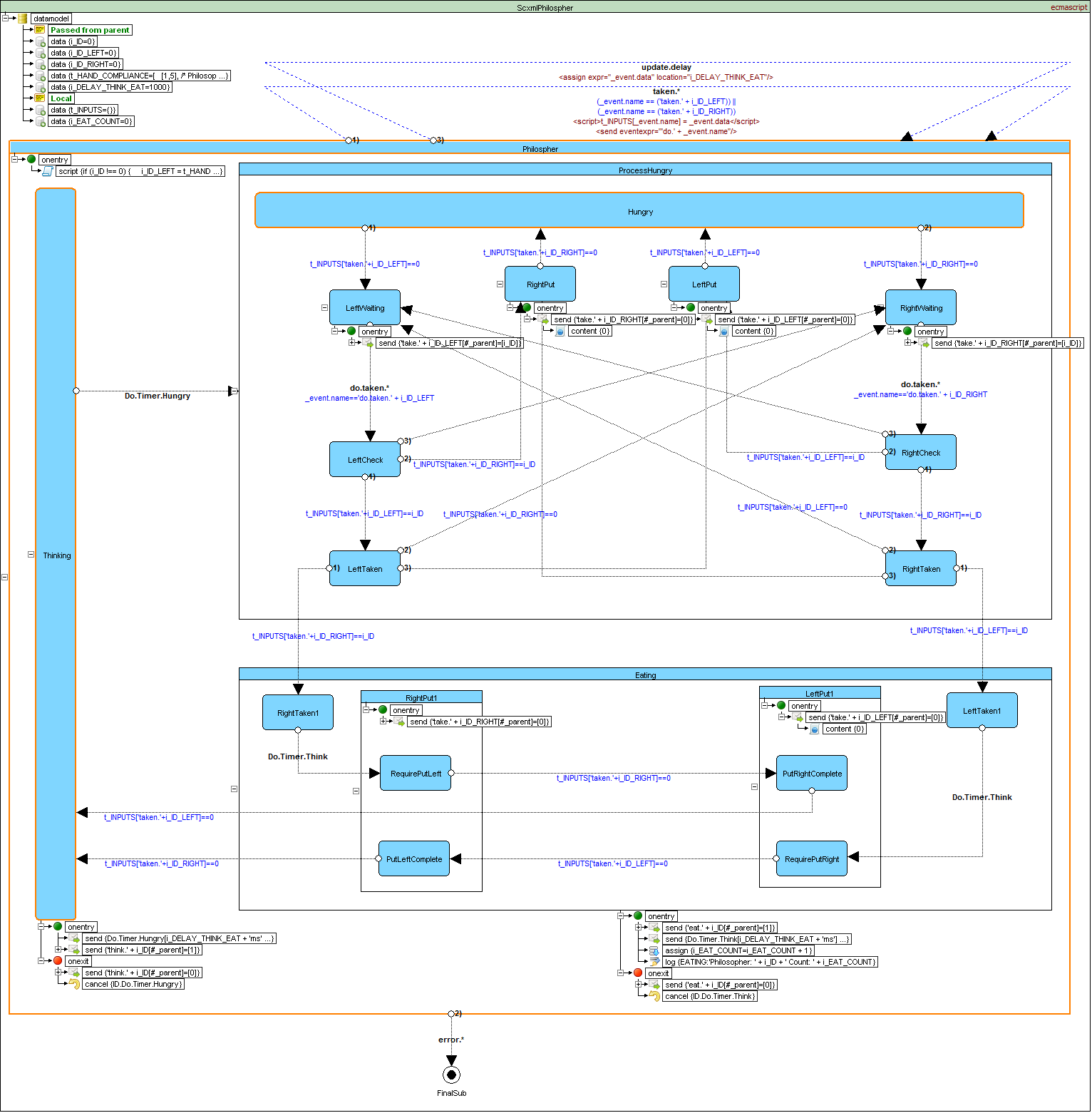
Source code - invoked.scxml
<scxml datamodel="ecmascript" initial="Philospher" name="ScxmlPhilospher" version="1.0" xmlns="http://www.w3.org/2005/07/scxml">
<datamodel><!--Passed from parent-->
<data expr="0" id="i_ID"/>
<data expr="0" id="i_ID_LEFT"/>
<data expr="0" id="i_ID_RIGHT"/>
<data expr="[
[1,5], /* Philosopher 1 */
[2,1], /* Philosopher 2 */
[3,2], /* Philosopher 3 */
[4,3], /* Philosopher 4 */
[5,4] /* Philosopher 5 */
]" id="t_HAND_COMPLIANCE"/>
<data expr="1000" id="i_DELAY_THINK_EAT"/><!--Local-->
<data expr="{}" id="t_INPUTS"/>
<data expr="0" id="i_EAT_COUNT"/>
</datamodel>
<state id="Philospher" initial="Thinking">
<onentry>
<script>if (i_ID !== 0) {
i_ID_LEFT = t_HAND_COMPLIANCE[i_ID - 1][0]
i_ID_RIGHT = t_HAND_COMPLIANCE[i_ID - 1][1]
}
t_INPUTS['taken.' + i_ID_LEFT] = 0
t_INPUTS['taken.' + i_ID_RIGHT] = 0
</script>
</onentry>
<transition cond="(_event.name == ('taken.' + i_ID_LEFT)) ||
(_event.name == ('taken.' + i_ID_RIGHT))" event="taken.*">
<script>t_INPUTS[_event.name] = _event.data</script>
<send eventexpr="'do.' + _event.name"/>
</transition>
<transition event="error.*" target="FinalSub"/>
<transition event="update.delay">
<assign expr="_event.data" location="i_DELAY_THINK_EAT"/>
</transition>
<state id="Eating">
<onentry>
<send eventexpr="'eat.' + i_ID" target="#_parent">
<content expr="1"/>
</send>
<send delayexpr="i_DELAY_THINK_EAT + 'ms'" event="Do.Timer.Think" id="ID.Do.Timer.Think"/>
<assign expr="i_EAT_COUNT + 1" location="i_EAT_COUNT"/>
<log expr="'Philosopher: ' + i_ID + ' Count: ' + i_EAT_COUNT" label="EATING"/>
</onentry>
<onexit>
<send eventexpr="'eat.' + i_ID" target="#_parent">
<content expr="0"/>
</send>
<cancel sendid="ID.Do.Timer.Think"/>
</onexit>
<state id="RightTaken1">
<transition event="Do.Timer.Think" target="RequirePutLeft"/>
</state>
<state id="LeftTaken1">
<transition event="Do.Timer.Think" target="RequirePutRight"/>
</state>
<state id="LeftPut1">
<onentry>
<send eventexpr="'take.' + i_ID_LEFT" target="#_parent">
<content expr="0"/>
</send>
</onentry>
<state id="RequirePutRight">
<transition cond="t_INPUTS['taken.'+i_ID_LEFT]==0" target="PutLeftComplete"/>
</state>
<state id="PutRightComplete">
<transition cond="t_INPUTS['taken.'+i_ID_LEFT]==0" target="Thinking"/>
</state>
</state>
<state id="RightPut1">
<onentry>
<send eventexpr="'take.' + i_ID_RIGHT" target="#_parent">
<content expr="0"/>
</send>
</onentry>
<state id="RequirePutLeft">
<transition cond="t_INPUTS['taken.'+i_ID_RIGHT]==0" target="PutRightComplete"/>
</state>
<state id="PutLeftComplete">
<transition cond="t_INPUTS['taken.'+i_ID_RIGHT]==0" target="Thinking"/>
</state>
</state>
</state>
<state id="Thinking">
<onentry>
<send delayexpr="i_DELAY_THINK_EAT + 'ms'" event="Do.Timer.Hungry" id="ID.Do.Timer.Hungry"/>
<send eventexpr="'think.' + i_ID" target="#_parent">
<content expr="1"/>
</send>
</onentry>
<onexit>
<send eventexpr="'think.' + i_ID" target="#_parent">
<content expr="0"/>
</send>
<cancel sendid="ID.Do.Timer.Hungry"/>
</onexit>
<transition event="Do.Timer.Hungry" target="ProcessHungry"/>
</state>
<state id="ProcessHungry" initial="Hungry">
<state id="Hungry">
<transition cond="t_INPUTS['taken.'+i_ID_LEFT]==0" target="LeftWaiting"/>
<transition cond="t_INPUTS['taken.'+i_ID_RIGHT]==0" target="RightWaiting"/>
</state>
<state id="LeftWaiting">
<onentry>
<send eventexpr="'take.' + i_ID_LEFT" target="#_parent">
<content expr="i_ID"/>
</send>
</onentry>
<transition cond="_event.name=='do.taken.' + i_ID_LEFT" event="do.taken.*" target="LeftCheck"/>
</state>
<state id="RightWaiting">
<onentry>
<send eventexpr="'take.' + i_ID_RIGHT" target="#_parent">
<content expr="i_ID"/>
</send>
</onentry>
<transition cond="_event.name=='do.taken.' + i_ID_RIGHT" event="do.taken.*" target="RightCheck"/>
</state>
<state id="LeftCheck">
<transition cond="t_INPUTS['taken.'+i_ID_LEFT]==i_ID" target="LeftTaken"/>
<transition cond="t_INPUTS['taken.'+i_ID_RIGHT]==i_ID" target="RightPut"/>
<transition target="RightWaiting"/>
</state>
<state id="RightCheck">
<transition cond="t_INPUTS['taken.'+i_ID_RIGHT]==i_ID" target="RightTaken"/>
<transition cond="t_INPUTS['taken.'+i_ID_LEFT]==i_ID" target="LeftPut"/>
<transition target="LeftWaiting"/>
</state>
<state id="LeftTaken">
<transition cond="t_INPUTS['taken.'+i_ID_RIGHT]==i_ID" target="RightTaken1"/>
<transition cond="t_INPUTS['taken.'+i_ID_RIGHT]==0" target="RightWaiting"/>
<transition target="LeftPut"/>
</state>
<state id="LeftPut">
<onentry>
<send eventexpr="'take.' + i_ID_LEFT" target="#_parent">
<content expr="0"/>
</send>
</onentry>
<transition cond="t_INPUTS['taken.'+i_ID_LEFT]==0" target="Hungry"/>
</state>
<state id="RightTaken">
<transition cond="t_INPUTS['taken.'+i_ID_LEFT]==i_ID" target="LeftTaken1"/>
<transition cond="t_INPUTS['taken.'+i_ID_LEFT]==0" target="LeftWaiting"/>
<transition target="RightPut"/>
</state>
<state id="RightPut">
<onentry>
<send eventexpr="'take.' + i_ID_RIGHT" target="#_parent">
<content expr="0"/>
</send>
</onentry>
<transition cond="t_INPUTS['taken.'+i_ID_RIGHT]==0" target="Hungry"/>
</state>
</state>
</state>
<final id="FinalSub"/>
</scxml>
Qt SCXML CPP Invoke Demo
Qt widget-based application that demonstrates how to invoke child state machines with QScxmlCppDataModel
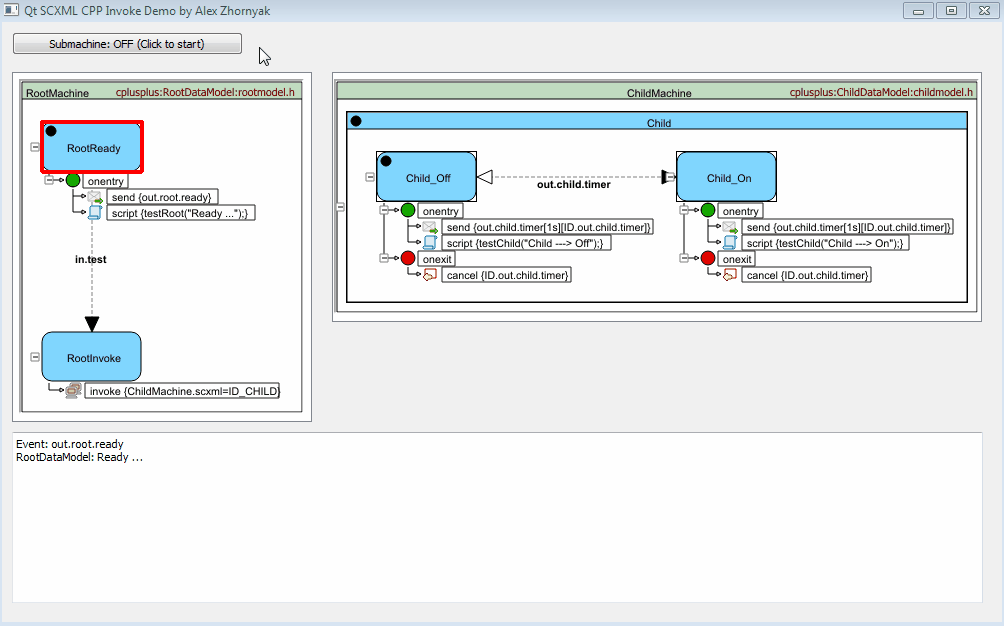
W3C IRP tests
1. Test 215
If the 'typeexpr' attribute is present, the SCXML Processor MUST evaluate it when the parent invoke element is evaluated and treat the result as if it had been entered as the value of 'type'.


2. Test 216
If the srcexpr attribute is present, the SCXML Processor MUST evaluate it when the parent invoke element is evaluated and treat the result as if it had been entered as the value of 'src'.


3. Test 220
Platforms MUST support http://www.w3.org/TR/scxml/, as a value for the 'type' attribute.


4. Test 223
If the 'idlocation' attribute is present, the SCXML Processor MUST generate an id automatically when the invoke element is evaluated and store it in the location specified by 'idlocation'.


5. Test 224
When the platform generates an identifier for 'idlocation', the identifier MUST have the form stateid.platformid, where stateid is the id of the state containing this element and platformid is automatically generated.


6. Test 225
In the automatically generated invoke identifier, platformid MUST be unique within the current session.



7. Test 226
When the invoke element is executed, the SCXML Processor MUST start a new logical instance of the external service specified in 'type' or 'typexpr', passing it the URL specified by 'src' or the data specified by <content>, or <param>.


8. Test 228
The Processor MUST keep track of the unique invokeid and insure that it is included in all events that the invoked service returns to the invoking session.


9. Test 229
When the 'autoforward' attribute is set to true, the SCXML Processor MUST send an exact copy of every external event it receives to the invoked process.


10. Test 230
When the SCXML Processor autoforwards an event to the invoked process, all the fields specified in 5.10.1 The Internal Structure of Events MUST have the same values in the forwarded copy of the event.


Output:
External Event: childToParent, interpreter [Scxml_Test230]
[Log] name is : "childToParent"
[Log] type is : "external"
[Log] sendid is : nil
External Event: childToParent, interpreter [ScxmlChild]
[Log] origin is : "#_scxml_35ebd509-4b45-419f-b021-3df9060f38cf"
[Log] origintype is : "http://www.w3.org/TR/scxml/#SCXMLEventProcessor"
[Log] name is : "childToParent"
[Log] invokeid is : "s0.3b6c2a1a-8bdf-42fe-bc0d-386cd510bf74"
[Log] type is : "external"
[Log] data is : nil
[Log] sendid is : nil
[Log] origin is : "#_scxml_35ebd509-4b45-419f-b021-3df9060f38cf"
[Log] origintype is : "http://www.w3.org/TR/scxml/#SCXMLEventProcessor"
[Log] invokeid is : "s0.3b6c2a1a-8bdf-42fe-bc0d-386cd510bf74"
[Log] data is : nil
Platform Event: done.invoke.s0.3b6c2a1a-8bdf-42fe-bc0d-386cd510bf74, interpreter [Scxml_Test230]
11. Test 232
The invoked external service MAY return multiple events while it is processing.


12. Test 233
If there is a finalize handler in the instance of invoke that created the service that generated the event, the SCXML Processor MUST execute the code in that finalize handler right before it removes the event from the event queue for processing.


13. Test 234
It MUST NOT execute the finalize handler in any other instance of invoke besides the one in the instance of invoke that created the service that generated the event.



14. Test 235
Once the invoked external service has finished processing it MUST return a special event 'done.invoke.id' to the external event queue of the invoking process, where id is the invokeid for the corresponding invoke element.


15. Test 236
The external service MUST NOT generate any other events after the invoke.done.invokeid event.


16. Test 237
If the invoking session takes a transition out of the state containing the invoke before it receives the 'done.invoke.id' event, the SCXML Processor MUST automatically cancel the invoked component and stop its processing.


17. Test 239
Invoked services of type http://www.w3.org/TR/scxml/, http://www.w3.org/TR/ccxml/, http://www.w3.org/TR/voicexml30/, or http://www.w3.org/TR/voicexml21 MUST interpret values specified by the content element or 'src' attribute as markup to be executed.



18. Test 240
Invoked services of type http://www.w3.org/TR/scxml/, http://www.w3.org/TR/ccxml/, http://www.w3.org/TR/voicexml30/, or http://www.w3.org/TR/voicexml21 MUST interpret values specified by param element or 'namelist' attribute as values that are to be injected into their data models.



19. Test 241
Invoked services MUST treat values specified by param and namelist identically.




20. Test 242
Invoked services MUST also treat values specified by 'src' and content identically.




21. Test 243
If the invoked process is of type http://www.w3.org/TR/scxml/ and 'name' of a param element in the invoke matches the 'id' of a data element in the top-level data declarations of the invoked session, the SCXML Processor MUST use the value of the param element as the initial value of the corresponding data element.


22. Test 244
If the invoked process is of type http://www.w3.org/TR/scxml/ and the key of namelist item in the invoke matches the 'id' of a data element in the top-level data declarations of the invoked session, the SCXML Processor MUST use the corresponding value as the initial value of the corresponding data element.


23. Test 245
If the invoked process is of type http://www.w3.org/TR/scxml/, and the name of a param element or the key of a namelist item do not match the name of a data element in the invoked process, the Processor MUST NOT add the value of the param element or namelist key/value pair to the invoked session's data model.


24. Test 247
If the invoked state machine is of type http://www.w3.org/TR/scxml/ and it reaches a top-level final state, the Processor MUST place the event done.invoke.id on the external event queue of the invoking machine, where id is the invokeid for this invocation.


25. Test 250
When an invoked process of type http://www.w3.org/TR/scxml/ is cancelled by the invoking process, the Processor MUST execute the onexit handlers for all active states in the invoked session.


Output:
External Event: foo, interpreter [Scxml_Test250]
[Log] "Exiting sub01"
[Log] "Exiting sub0"
26. Test 252
Once it cancels an invoked session, the Processor MUST NOT insert any events it receives from the invoked session into the external event queue of the invoking session.


27. Test 253
When the invoked session is of type http://www.w3.org/TR/scxml/, The SCXML Processor MUST support the use of SCXML Event/IO processor to communicate between the invoking and the invoked sessions.


28. Test 530
The SCXML Processor MUST evaluate a child content element when the parent invoke element is evaluated and pass the resulting data to the invoked service.


29. Test 554
If the evaluation of the invoke element's arguments produces an error, the SCXML Processor MUST terminate the processing of the element without further action.


| TOP | Contents | Overview | Examples | Editor | Forum |
|---|